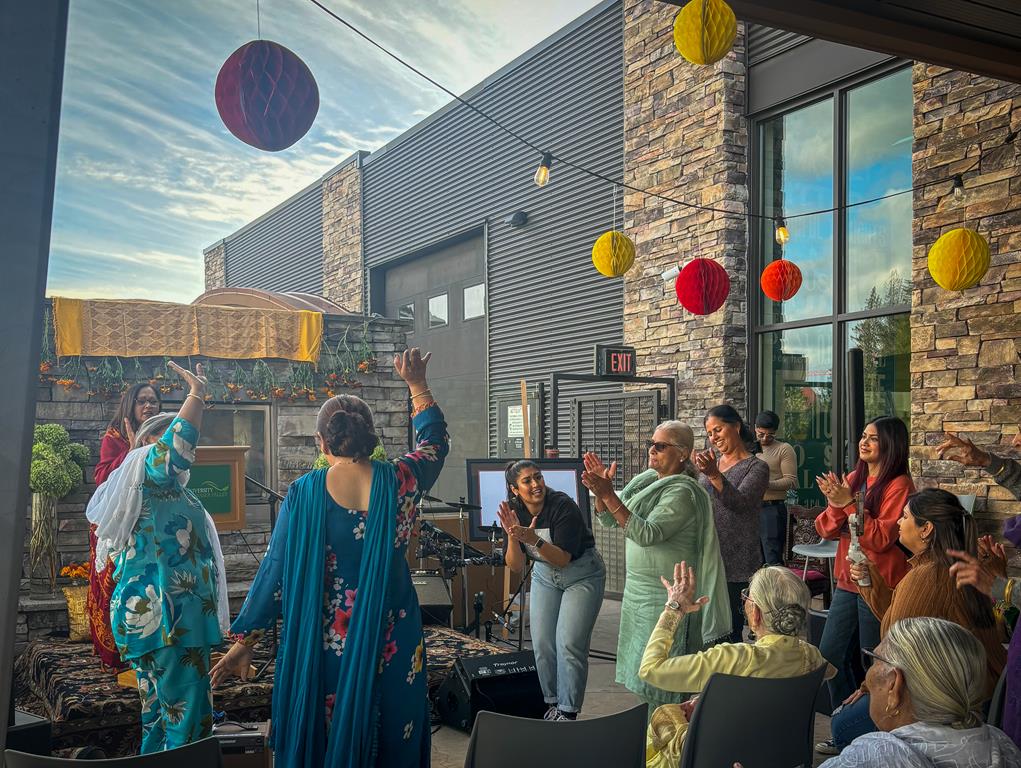On Sept. 19, the South Asian Studies Institute (SASI) organized UFV’s first ever South Asian Folk Music event, MEHFIL. It was hosted on the patio of K Building after over six months of recording, translating, and transcribing treasures of South Asian music and poetry. The ambience rhythmed to soulful South Asian Folk Music as SASI brought together the community with renowned artists Devinder Kaur Johal, Daksh Kubba, Harinder Saini, and Gurmukh Singh to celebrate culture, art, and connection.
The event was proposed by Surrey-based physician, Dr. Madhumeet Kaur Jawanda, who spearheaded outreach to the SASI community during the COVID-19 pandemic. According to SASI’s director, Dr. Satwinder Bains, Dr. Jawanda was inspired by some of her patients. In an email to Dr. Bains, Dr. Jawanda shared, “I have elderly patients 75 years and older who share their poetry, songs, and Giddha Boliyaan with me. Is there any way we can showcase their talent? They are so special.”
The idea inspired SASI to create a collection of folk songs as part of their South Asian Canadian Digital Archive (SACDA). So far, the SACDA team has documented the work of 10 artists with over 50 folk songs and poems. SASI plans to reach out to diverse South Asian Canadian communities in the Lower Mainland and the Fraser Valley to document more songs. While the project continues, MEHFIL was an event to celebrate what it has accomplished so far.

The event began with 88-year-old Devinder Kaur Johal and her poems on women’s empowerment and identity. Johal, who began writing in her sixties to cope with depression, now has eight published books of poetry. At 82, she won the Most Popular Vote at the PICS Golden Glam-Ma Beauty Pageant. Reflecting on her journey, she said, “I don’t remember much about singing… no one listened when I sang, but I still used to sing in secret. It wasn’t considered proper at that time, but singing and writing makes me immensely happy.”
The evening continued with a Punjabi folk music performance by Harinder Saini, the founder and lead singer of Raunkaan Events. The patio echoed with classic Punjabi Boliyan and folk songs as Saini sang and women from the community danced Giddha. Brought up in a musical family, she now calls music her “Rooh Di Khurak (food of soul)… “When nothing else works for me, music works for me.”
Taking over the stage next was Daksh Kubba with his band naQsh: lead guitarist Imran Habib; bassist and drummer Aman Tohan; and guitarist Asim Khan. Kubba, who started music as an escape from a life where he couldn’t express himself, found his freedom being on stage. Sharing what drives him he said, “People inspire me. I write songs about my friends and relationships. Anything that deeply touches you, is inspiring in any form.” He also added that, to him, “Honesty and truth is, I think, the middle of it all.” Daksh released his debut solo album in 2022, titled Not Just a Singer and is currently working on many new projects.
The night concluded with a performance from singer Gurmukh Singh and drummer Swaraj Aiden. Singh, a Punjabi artist, drew his inspiration from the legendary singer Mohammad Rafi. He formed his band, Musafir, and has performed over 500 shows across India. He also recently released an album titled Trapped. Answering to what inspires him to sing, Singh replied, “I don’t have any answer to it but I can’t live without it.’’ An introvert off-stage, he finds it easier to express himself on stage.

Harveen Kaur, a business administration student at UFV shared, “I have never attended any event like this. I love it, this evening! The artists were very nice and everyone sang so well. I feel like [I’m at] home.”
Psychology student Kanishka Takyar echoed similar sentiments, “It was the best experience of the evening; the music, the vibes were amazing. It gave me the India feeling I was missing.”
On making MEHFIL an annual tradition, Dr. Bains mentioned, “The audience seems to demand it too. We had so many audience members come up and ask us about the next event and if we could do something for seniors that would allow them to maintain their connections to languages, history, culture, art, and music.”
Events like these not only cultivate cultural diversity, but also offer many students, like Kaur and Takyar, a sense of home while they chase their dreams overseas. When asked if she would like to attend again, Takyar said absolutely, and that she is feeling called to get involved. Events like these create lasting cultural connections that help keep traditions alive while enriching the entire community.



